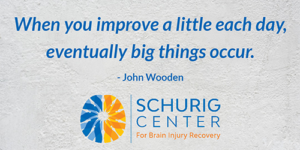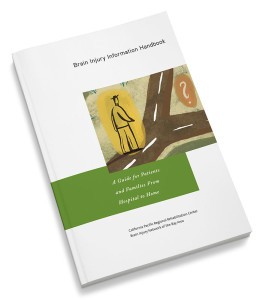Here’s are a few gift ideas that might help improve quality of life for your friend or loved one who is living with a brain injury, concussion, or stroke.
- Voice memo recorder – A helpful, auditory version of a self-stick note! This easy-to-use, hand-held gadget can be used to record messages to oneself throughout the day. Recorders are great for people who are unable to write due to aphasia or motor problems. They’re also helpful in capturing “on-the-fly” thoughts or to-do items that can be listened to later and transferred to a calendar, planner or to-do list.
- Journal or planner – Journals and planners are wonderful gifts to help keep a person organized and on-track with their “to-do” lists. For many survivors, they are an essential tool in managing day-to-day activities, like paying bills and attending appointments. Journals are also meaningful gifts that can help a person express his/her thoughts and emotions as they process the changes in their life after a brain injury.
- Subscription to an app – There are many apps available that can help enrich a person’s life after a brain injury. Calm is an app for meditation, restful sleep, mindful movement, and music for focus, relaxation, and sleep. Audible is a great app for an avid reader that may be finding that reading is more difficult after a brain injury.
- Scanmarker – A Scanmarker is hand-held digital highlighter and scanner pen that scans words on a paper and wirelessly uploads them to your smartphone, tablet, or computer. Wherever you use your keyboard to type – Scanmarker instantly types it for you. A great gift for a person who is unable to write legibly or type due to aphasia or motor problems.
- Post-it notes – A bulk supply of self-stick notes in various sizes and colors (lighter colors are best) are a great stocking stuffer to help a survivor stay organized. Strategically placed around the house, the car, or in a planner, self-stick notes are useful “reminder” tools.
- Automatic shut-off appliances – Auto shut-off appliances, like irons or coffee brewers, can truly be a lifesaver for a survivor whose memory may not be as good as it once was.
- Subscription to a meal service – Grocery shopping and preparing healthy food can be challenging after a brain injury because a person may not be able to go to the grocery store on their own. These meal services are extra helpful because food arrives portioned into the correct measurements with recipe options. Not having to worry about grocery shopping or measuring foods can really take off a lot of stress off eating healthy.
- Prepaid bus pass or Uber/Lyft gift card – Many survivors aren’t able to drive and must rely on public transportation or friends and family to get around town. The gift of transportation is a wonderful way to promote a feeling of independence.
- Gym or pool membership – Keeping active and getting ample physical exercise is good for everyone’s health, including brain injury survivors. But, a survivor may not be able to work after their injury and are unable to afford a gym or pool membership. Consider even paying for a trainer to work with the person one-on-one. An exercise, Qi Gong, or yoga DVD is also a great gift.
- Noise cancelling headphones – A person can often be triggered by noises after a brain injury. Noise cancelling headphones can help provide relaxation by drowning out loud, triggering noises or promote sleep for people who are very sensitive to noise while sleeping.
- Extra-large key chain – A great way to help someone keep track of keys. Some key chains even come with a beeper-finder feature.
- Pillow or weighted blanket – Headaches and difficulty sleeping are common side effects that can be experienced after a brain injury. Upgrading to a quality pillow can help reduce headaches. Buy a quality pillow or give a store gift card so the recipient can pick out a pillow of his/her preference. A weighted blanket is pretty much what it sounds like – a heavy blanket. When placed on the body, the weight feels comforting without being restrictive. It is believed to offer many benefits, including improved sleep and anxiety reduction. The weight of the blanket should be specific to the person using it. The general formula for picking a weight is 10% of the user’s body weight plus a pound or two.
- Adaptive eating and kitchen utensils – It can sometimes be hard to use traditional utensils to eat or prepare food after a brain injury. There are many different types of adaptive eating and kitchen utensils to help aid in the process, like adaptive silverware, a rocking knife, or snug straw.
- Essential oil diffuser – Essential oils are natural aromatic plant compounds that are believed to offer a variety of benefits. Peppermint can help with headaches. Lavender is known for calming and relaxing properties. Frankincense can offer wonderful mood support; help improve focus and concentration, and may reduce irritability and restlessness.
- Eye mask or sun blocking curtains – A brain injury survivor may experience periods of insomnia. An eye mask or sun blocking curtains can help a person sleep well during the day.
- Jigsaw puzzle – Jigsaw puzzles can be a great therapeutic tool to help rebuild cognitive abilities. Start with a 25-piece puzzle and graduate to larger puzzles as a person’s abilities improve.
- Hands-free hair blow dryer holder – After a brain injury, many people don’t have the same coordination in their hands and arms that they once had. A wall-mounted, hands-free blow dryer holder can help make creating the perfect “hair-do” much easier.
- Shoe lace anchors – Some survivors may find it challenging to tie shoe laces. Lace anchors are a great stocking stuffer that will help pull laces tight without having to tie.
- Watch – After a brain injury, people often find that they lose track of time because their “internal clock” may be off. An easy-to-read watch, showing the time, day and date can be super helpful. Many watches even come with alarm settings and displays to program in phone numbers and appointments. An alarm feature can help survivors learn to take their medications independently or serve as a reminder to cue a person to their next task or appointment.
- Give a gift from the heart to help make everyday living easier – Daily living with the effects of a brain injury can be challenging. There are many meaningful and personal gifts you can offer that will help improve a person’s quality of life. Offer to help organize bills or help run errands. Pay a bill. Living with a brain injury can be expensive, especially if a person is unable to work after his/her injury. Offering to pay a bill is a great way to help ease financial burdens. Hire a cleaning service. Prepare and share a home cooked meal. Not sure how you can help? Just ask.



